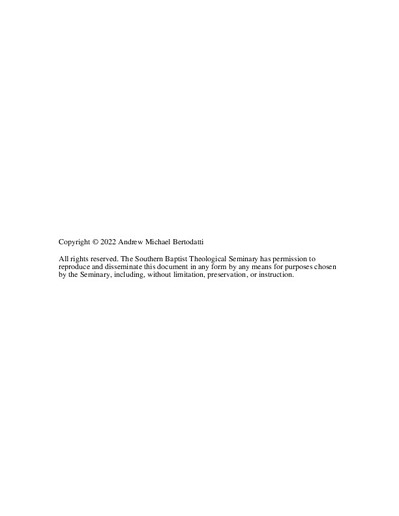| dc.contributor.advisor | Jones, Timothy Paul | |
| dc.contributor.author | Bertodatti, Andrew | |
| dc.date.accessioned | 2022-05-31T19:50:48Z | |
| dc.date.available | 2022-05-31T19:50:48Z | |
| dc.date.issued | 2022-05-01 | |
| dc.identifier.uri | https://hdl.handle.net/10392/6753 | |
| dc.description.abstract | While White evangelical Protestants and Black Protestants are remarkably similar across measures of theological belief and practice, their views on racial issues tend to be deeply divergent. These divergent views have often been a source of racial alienation when applied to contemporary discourse about the state of race relations and racial dynamics in the United States. This thesis seeks to contribute to research that emphasizes the significance of disparate racial stratification beliefs of Black Protestants and White evangelical Protestants.This thesis argues that the case study of Lecrae Moore’s public engagement regarding the Ferguson unrest suggests that Black Protestants and White evangelical Protestants applied different racial stratification beliefs to the issues of racial inequality and racialized incidents of violence in the 2010s, which carried significant implications for the general trend of division between these two groups over said issues. The thesis reflects on sociological research, data, and analyses within the historical context of the contemporary church, namely in the years leading up to and following the Ferguson unrest. It explores where these two groups diverge on perceptions of racial issues, examines explanations for this divergence, and recounts the impact of bringing these disparate beliefs to bear on racial discourse within American Protestantism in the 2010s. Additionally, this thesis applies the synthesis of sociological research, data, and analyses to the particular case study of Lecrae Moore’s public engagement regarding the Ferguson unrest by analyzing Moore’s memoirs, op-eds, social media engagement, and critical responses to his engagement. The findings of this case study advance the argument that disparate racial stratification beliefs were a key feature of racial alienation experienced by White evangelical Protestants and Black Protestants in the 2010s. | en_US |
| dc.subject.lcsh | Lecrae (Musician) | en_US |
| dc.subject.lcsh | Race relations--Religious aspects--Christianity | en_US |
| dc.subject.lcsh | Racism--Religious aspects--Christianity | en_US |
| dc.subject.lcsh | Reconciliation--Religious aspects--Christianity | en_US |
| dc.subject.lcsh | Social stratification | en_US |
| dc.subject.lcsh | Ferguson (Mo.)--Race relations | en_US |
| dc.title | Lecrae and the Differing Perceptions Among American Protestants of the Causes of Disparate Racial Experiences | en_US |
| dc.type | Text | |
| dc.type | Electronic thesis | en_US |
| dc.type.qualificationname | Th.M. | en_US |
| dc.publisher.institution | Southern Baptist Theological Seminary | en_US |
| dc.publisher.department | School of Missions and Evangelism | |

